 Petzlover
Petzlover Peterbald is originated from Russia but Siamese is originated from Thailand. Both Peterbald and Siamese are having almost same weight. Peterbald may live 5 years less than Siamese. Both Peterbald and Siamese has same litter size. Peterbald requires Moderate Maintenance. But Siamese requires Low Maintenance
Peterbald is originated from Russia but Siamese is originated from Thailand. Both Peterbald and Siamese are having almost same weight. Peterbald may live 5 years less than Siamese. Both Peterbald and Siamese has same litter size. Peterbald requires Moderate Maintenance. But Siamese requires Low Maintenance
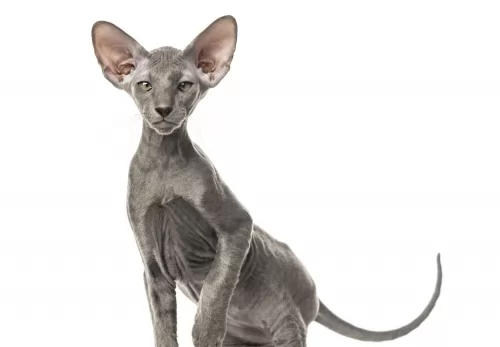 As a newer and rare cat breed, the Peterbald cat’s history is somewhat limited.
As a newer and rare cat breed, the Peterbald cat’s history is somewhat limited.
The breed was first developed in 1994, when a Russian breeder named Olga S. Mironova crossed an Oriental Shorthair cat with a Don Sphynx cat. This cat was to be known as the Peterbald.
The Peterbald cat is recognized by the Cat Fanciers Association. It was also accepted by The International Cat Association in 1997.
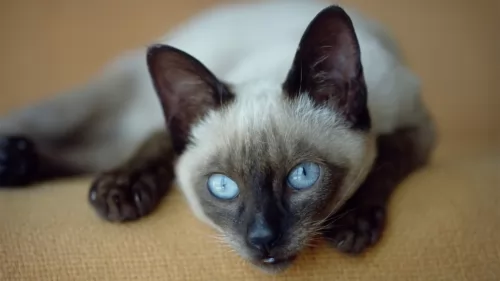 The Siamese cat is one of the most recognized cat breeds there are. The cat hails from Thailand and is the foundation stock for a number of other breeds.
The Siamese cat is one of the most recognized cat breeds there are. The cat hails from Thailand and is the foundation stock for a number of other breeds.
It comes in two distinct variations - traditional and the more modern Siamese.
In the United States, most of the top cat registries only consider the 4 original fur colors as Siamese – chocolate point, seal point, blue point, and lilac point.
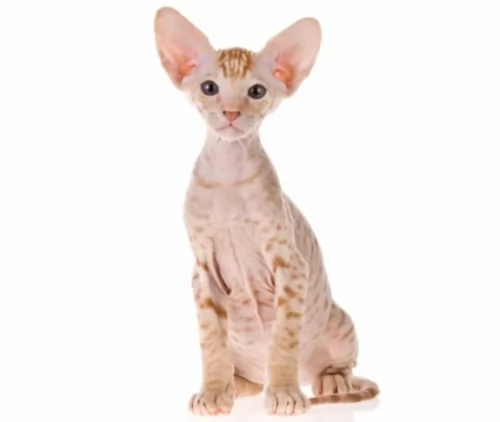 Looking a little bit futuristic, with a long, narrow head, almond-shaped eyes and large, pointed ears, the medium-sized, slimly built Peterbald cat can weigh between 3 and 6kg and is essentially a hairless cat.
Looking a little bit futuristic, with a long, narrow head, almond-shaped eyes and large, pointed ears, the medium-sized, slimly built Peterbald cat can weigh between 3 and 6kg and is essentially a hairless cat.
Although Peterbalds are considered a cat breed that are essentially hairless, not all of them are hairless as there are some that have a very short coat. There are some that are born with quite a bit of hair but they lose this.
In fact, their coat color as well as certain markings can be in various shades and patterns.
Peterbalds are easy-going, social cats with a sweet nature. They are affectionate towards their human companions and are quite vocal too, liking to talk to their owners. They are active and playful and enjoy playing with children and even other pets in the home.
In fact, they are adaptable cats and will slot into different home environments and lifestyles. The hairless variety is best as an indoor cat and this is why they suit living in apartments as well.
They are independent and intelligent, and people who have owned them say their pets often behave like a dog, wanting to be involved in their human's activities.
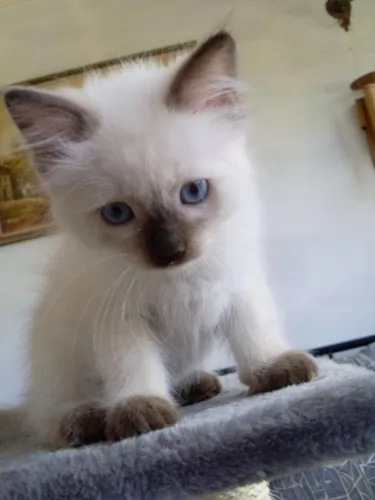 The Siamese cat is a medium-sized cat. Today’s Siamese cat is recognized by the triangular-shaped head, the slender, muscular body, the blue almond-shaped eyes, the largish ears, and the cream point colored coat.
The Siamese cat is a medium-sized cat. Today’s Siamese cat is recognized by the triangular-shaped head, the slender, muscular body, the blue almond-shaped eyes, the largish ears, and the cream point colored coat.
The face of the Siamese also has a mask of the same point color. Weighing at between 3 – 5kg, the Siamese has a long neck and slender tail.
All Siamese kittens are cream or white at birth, but they develop visible points in the first few months of life. The coat is short and glossy. By the time the kitten is 4 weeks old, the points are clearly distinguishable.
Siamese are affectionate, curious, playful, intelligent cats and are known for their vocal, social natures.
With the Siamese cat, you may see him bonding strongly with one particular person in the family.
They’re active cats and are also one of these cat breeds that are described as being more dog-like. Some of them become so attached to their human owners that they can become depressed or suffer from separation anxiety when left alone for long periods of time.
Because of the cat’s intelligence, he can be easily trained to respond to simple commands.
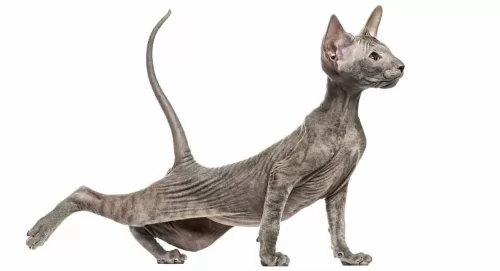 These Peterbalds are very intelligent cats and also very affectionate with their human owners. They are always up for a game and are playful and social.
These Peterbalds are very intelligent cats and also very affectionate with their human owners. They are always up for a game and are playful and social.
While they make excellent family pets and companions, one just has to take special precautions with the hairless variety and ensure that they don't become too hot or too cold.
They’re balanced in nature and adapt to the different human personalities in the household as long as its human owners are kind and respectful towards animals. With the right level of love, kindness and respect, they become ideal companions.
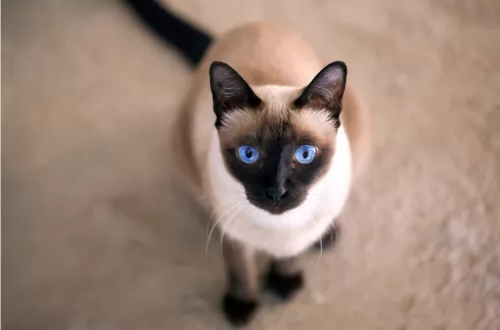 The Siamese cat is such a popular breed and with good reason. It makes a splendid companion for single people, families, couples, and older people. It gets on well with children and other pets too.
The Siamese cat is such a popular breed and with good reason. It makes a splendid companion for single people, families, couples, and older people. It gets on well with children and other pets too.
However, it is an energetic cat and won’t relish lying around day after day. He will want you to play with him and exercise him too, providing him with a stimulating environment.
These are such affectionate cats too, that it will be too sad if he lands up in a home where people don’t provide him with love and care. In exchange for that, you couldn’t ask for a better companion and friend.
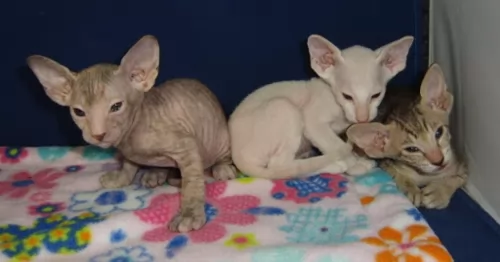 One of the more obvious things to watch out for with this particular cat is his hairlessness. This means he is more susceptible to the cold as well as to the heat. If he is outdoors, you have to be careful with his skin as it could get burned. Rough play with children could also cause scratching of the sensitive skin.
One of the more obvious things to watch out for with this particular cat is his hairlessness. This means he is more susceptible to the cold as well as to the heat. If he is outdoors, you have to be careful with his skin as it could get burned. Rough play with children could also cause scratching of the sensitive skin.
This particular cat is a fairly new breed and so there are few genetically inherited problems to be careful of.
Their large ears might prove to be a problem, and you will need to check the interiors and see that they remain clean. Also, trim his claws. If you fear that you could hurt your cat while attempting to groom him, rather take him along to professional, reputable pet groomers or have your vet do these grooming processes for you.
Whenever your Peterbald is sick you will need to get him to the vet. As it is, as a kitten, he will need to be taken to the vet to have his regular vaccines to protect him from some of the deadly cat diseases there are.
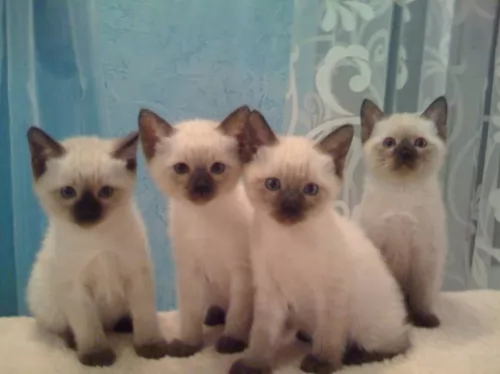 With good care, your Siamese cat can live to be between 12 and 20 years of age. It is a slim cat, so you want to keep him that way as becoming overweight can put a whole lot of pressure on the cat’s joints and bring on other health issues.
With good care, your Siamese cat can live to be between 12 and 20 years of age. It is a slim cat, so you want to keep him that way as becoming overweight can put a whole lot of pressure on the cat’s joints and bring on other health issues.
There are always some common cat diseases to watch out for and one of these is mammary tumors. They also battle with gastrointestinal problems and lung infections.
They are actually prone to respiratory problems, but this is more seen in younger cats. Upper respiratory infection with the Siamese cat will usually last about a week or it can go on longer.
Your cat with have a nasal or eye discharge, will be drooling as well as have ulcers around the nose and mouth with aches and pains aa well as lethargy.
Make sure that your Siamese cat is up to date with his vaccinations.
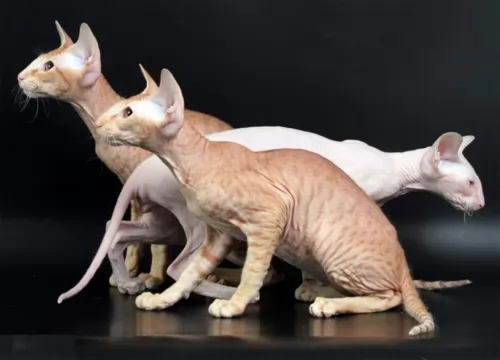 The Peterbald cat with its little or no hair is considered to be a low-maintenance cat. Their owners don’t have to worry about excessive shedding. Bathing these cats is important so that oils don't build up and cause skin irritation.
The Peterbald cat with its little or no hair is considered to be a low-maintenance cat. Their owners don’t have to worry about excessive shedding. Bathing these cats is important so that oils don't build up and cause skin irritation.
These cats are also best as indoor cats, but then again, some gentle sunshine on the skin will do him the world of good, and he loves the feel of the warm sun.
There are some Peterbald cat owners who gently bath their cats, sometimes once a week to get rid of the oil on the skin. If it isn’t possible to bath your cat, check out at your local vet as you do get special wipes for these cats that are effective in removing dirt and oil.
Also, speak to your vet about skincare and the possibility of moisturizing creams specially made for these cats and which are gentle and non-toxic.
This is a slim, athletic cat, and like all other cats, you have to be careful about weight issues. Any amount of weight with this cat can bring on a host of health issues such as extra pressure on the joints, not to mention other weight-related diseases such as diabetes and heart disease.
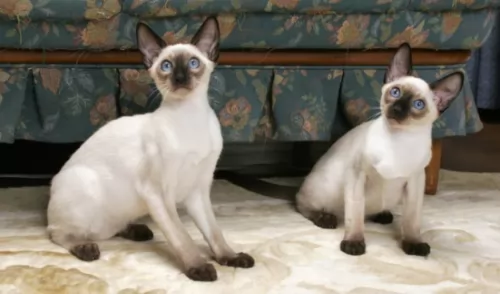 Good diet is one of the most important ways to care for your Siamese cat. Your cat is a carnivore and you therefore need to ensure he gets an appropriate diet otherwise you’re going to be spending more time at the vet with a sick cat than you’d like to.
Good diet is one of the most important ways to care for your Siamese cat. Your cat is a carnivore and you therefore need to ensure he gets an appropriate diet otherwise you’re going to be spending more time at the vet with a sick cat than you’d like to.
Always check with your vet if you have any uncertainties about feeding your Siamese kitten. Kittens will eat different food to an adult, and even in adulthood, there is commercial cat food manufactured for adult cats, pregnant felines, lactating cats, energetic cats, senior cats and sick cats.
Where possible, you will need to try and provide your cat with some fresh, raw meat too.
Never leave your cat without a bowl of fresh, cool water night and day.
The coat of the Siamese cat is thick, soft, and silky and he will require a brush every week to keep it like that.
They are agile, athletic cats, loving to jump up onto perches so it will be a good idea to provide a climbing tree or some other equipment where the cat can leap up onto.
Provide your cat with a litter box and make sure that the cat’s feces are removed every single day.